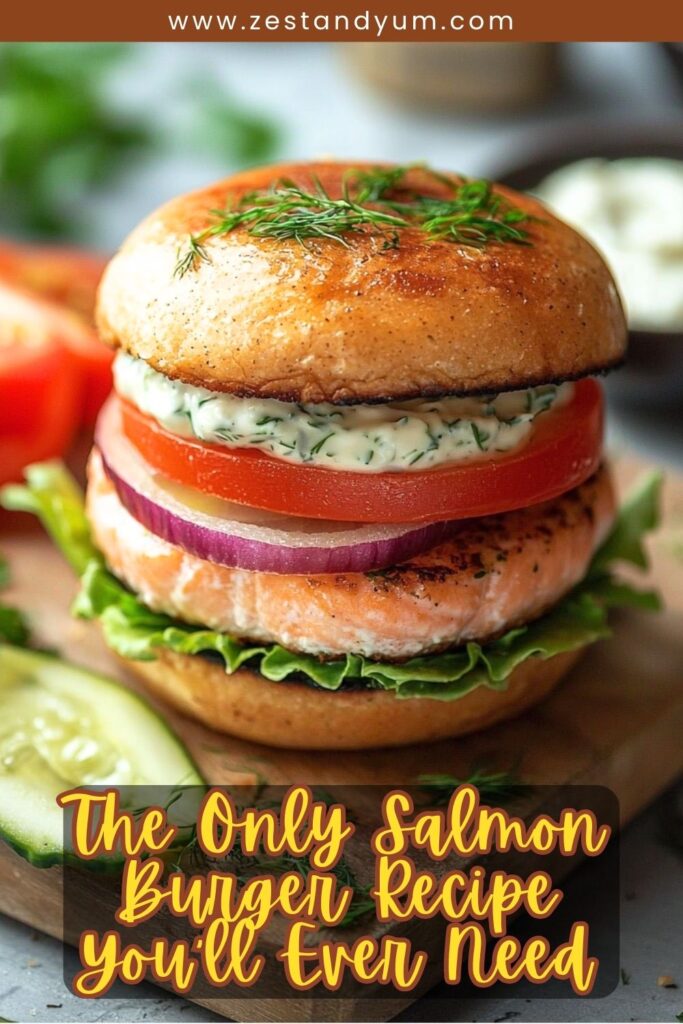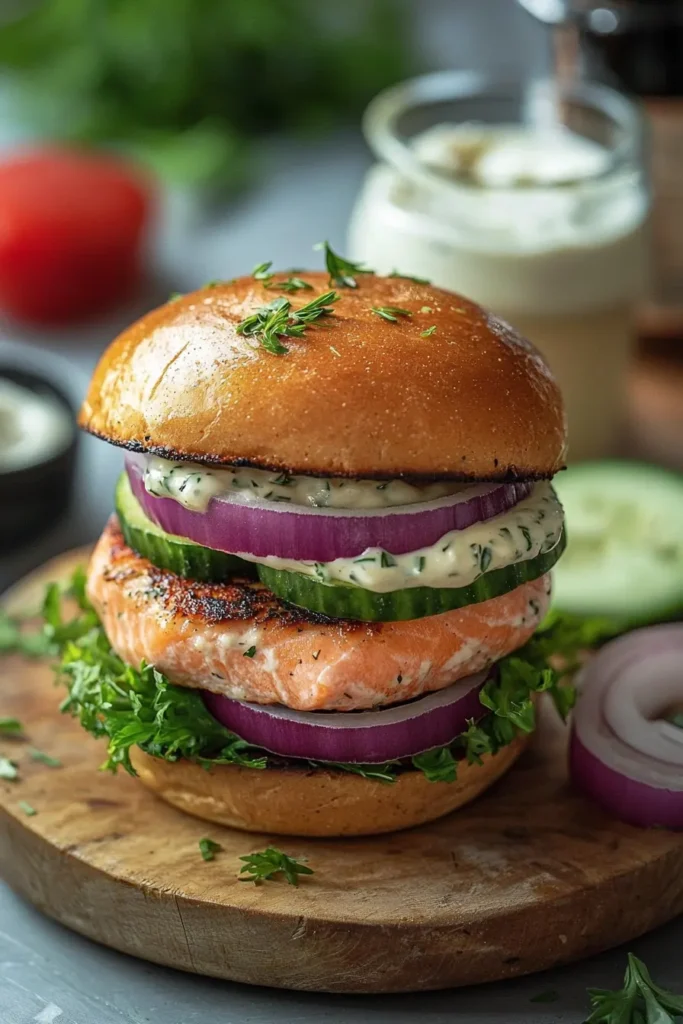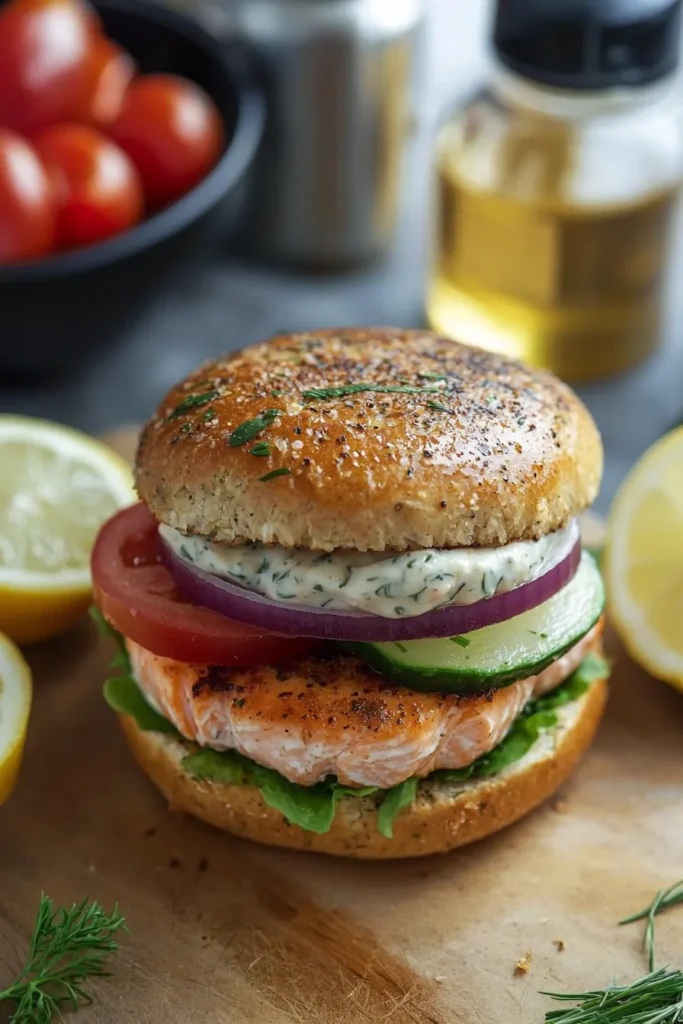What Are Salmon Burgers and How Do They Taste?
Salmon burgers are patties crafted from fresh or canned salmon, blended with seasonings and binders like breadcrumbs or eggs. These burgers offer a rich, savory flavor profile enhanced by herbs, spices, and optional tangy sauces like tartar or aioli. Unlike traditional beef burgers, salmon burgers provide a healthier alternative without sacrificing satisfaction. Packed with omega-3 fatty acids and lean protein, they cater to health-conscious eaters while delivering bold, satisfying flavors. Whether you’re grilling them for a summer barbecue or pan-searing for a quick weeknight meal, these burgers bring a delightful balance of textures and tastes. With their versatility and nutritional benefits, salmon burgers stand out as a delicious seafood alternative that’s both easy to prepare and indulgent enough for any occasion.
Why You’ll Love This Salmon Burgers Recipe
Salmon burgers are a standout dish that combines fresh ingredients, bold flavors, and a quick cooking process, making them perfect for weeknight meals or gatherings. Their appeal lies in their ability to satisfy health-conscious eaters, pescatarians, and anyone eager to try something new. These burgers are incredibly versatile serve them casually on buns with classic toppings like avocado and pickles, or elevate them with elegant presentations like lettuce wraps and gourmet sauces. The rich taste of salmon pairs beautifully with herbs, spices, and tangy accompaniments, ensuring every bite is flavorful and satisfying. Whether you’re looking for healthy burger recipes or easy dinner ideas, this salmon burgers recipe delivers on taste, convenience, and creativity, making it a must-try addition to your culinary repertoire.
Ingredients and Substitutions
To craft the ultimate salmon burgers, gather high-quality ingredients for optimal flavor. Start with 500 grams of fresh or canned salmon, ½ cup breadcrumbs (or almond flour for gluten-free), 1 egg, 2 cloves minced garlic, juice of 1 lemon, and 2 tablespoons chopped fresh dill or parsley. Enhance the taste with 1 tablespoon Dijon mustard, 1 teaspoon capers, or a pinch of smoked paprika for depth. For dietary substitutions, use flax eggs for vegan diets or mashed avocado as a plant-based binder. Optional add-ins like diced red onion, bell peppers, or jalapeños provide extra texture and flavor. These essential burger ingredients ensure your salmon burgers are customizable, nutritious, and packed with bold flavors. With allergy-friendly options and creative variations, you can tailor the recipe to suit your preferences while maintaining its irresistible charm.
How Do You Make Salmon Burgers?
To make salmon burgers, start by finely chopping or processing 500 grams of salmon into small pieces. In a bowl, mix the salmon with ½ cup breadcrumbs, 1 egg, 2 cloves minced garlic, juice of 1 lemon, and 2 tablespoons chopped dill or parsley. Add flavor enhancers like 1 tablespoon Dijon mustard or a pinch of smoked paprika for depth. Form the mixture into evenly sized patties and chill in the fridge for 15–30 minutes to firm up. Cook the patties on the stovetop over medium heat, grill, or bake in the oven at 375°F (190°C) until golden brown and cooked through, about 4–5 minutes per side. Serve on buns or lettuce wraps with toppings like tartar sauce, sliced avocado, or pickles. These step-by-step burger guide techniques ensure your salmon burgers are perfectly cooked, flavorful, and ready to impress. With easy salmon recipes like this, you’ll have a quick, nutritious dish perfect for any occasion.
Chopping the Salmon with a Knife vs Using a Food Processor
When preparing salmon burgers, the method you choose for chopping the salmon impacts texture. Using a knife creates chunkier patties, preserving the salmon’s natural texture and preventing over-processing. A food processor, on the other hand, is faster and easier but may result in smoother, less textured patties. For the best of both worlds, combine methods pulse part of the salmon in the food processor for cohesion while hand-chopping the rest for added texture. These salmon preparation techniques ensure your patties are both cohesive and satisfying. With these texture tips and food processor hacks, you’ll achieve perfectly balanced salmon burgers every time.
How to Cook Salmon Burgers Perfectly?
To cook salmon burgers perfectly, choose the method that suits your preference. For a crispy exterior, sear the patties on the stovetop in olive oil or butter over medium heat. Grilling enthusiasts should oil the grates and use medium heat to prevent sticking while achieving charred edges. Baking at 375°F (190°C) offers even cooking without added fat, making it a healthier option. Avoid overcooking by ensuring the internal temperature reaches 145°F (63°C) for safe consumption. These perfect burger techniques and cooking salmon tips guarantee your salmon burgers are juicy, flavorful, and perfectly cooked. With these crispy patty methods, you’ll master the art of creating restaurant-quality results at home.
See Also:
Salmon Burgers Frequently Asked Questions
Q: Can I use canned salmon instead of fresh salmon?
A: Yes, drain and flake canned salmon thoroughly before mixing.
Q: What can I substitute for breadcrumbs?
A: Almond flour, crushed crackers, or oats work well for binding.
Q: Is this recipe gluten-free?
A: It can be made gluten-free by using certified gluten-free ingredients.
Q: How do you prevent the patties from falling apart?
A: Chill them before cooking and ensure proper binding ratios.
Q: Can I make these burgers ahead of time?
A: Yes, prepare and refrigerate patties for up to 24 hours before cooking.
How Do You Know When Salmon Burgers Are Done?
To determine doneness for salmon burgers, rely on visual cues and texture tests. The patties should be golden brown on the outside and opaque on the inside. Use a meat thermometer to check that the internal temperature has reached 145°F (63°C) for safe consumption. Gently press the center of the patty it should feel firm but not dry. These doneness tips and cooking safety techniques ensure your salmon burgers are perfectly cooked every time. With these salmon burger techniques, you’ll achieve consistent results that are both safe and delicious.
What to Serve With Salmon Burgers
Elevate your salmon burgers with thoughtful presentation and pairings. Serve them in brioche buns, lettuce wraps, or over salad greens for a lighter option. Pair with sides like sweet potato fries, coleslaw, or roasted vegetables to create a balanced meal. Sauce options such as tartar sauce, aioli, or sriracha mayo add extra flavor and elegance. These elegant plating ideas and hearty meal pairings ensure your salmon burgers feel indulgent yet approachable. Whether served casually or at gatherings, these refreshing sauces and thoughtful combinations make this dish a standout at any table.
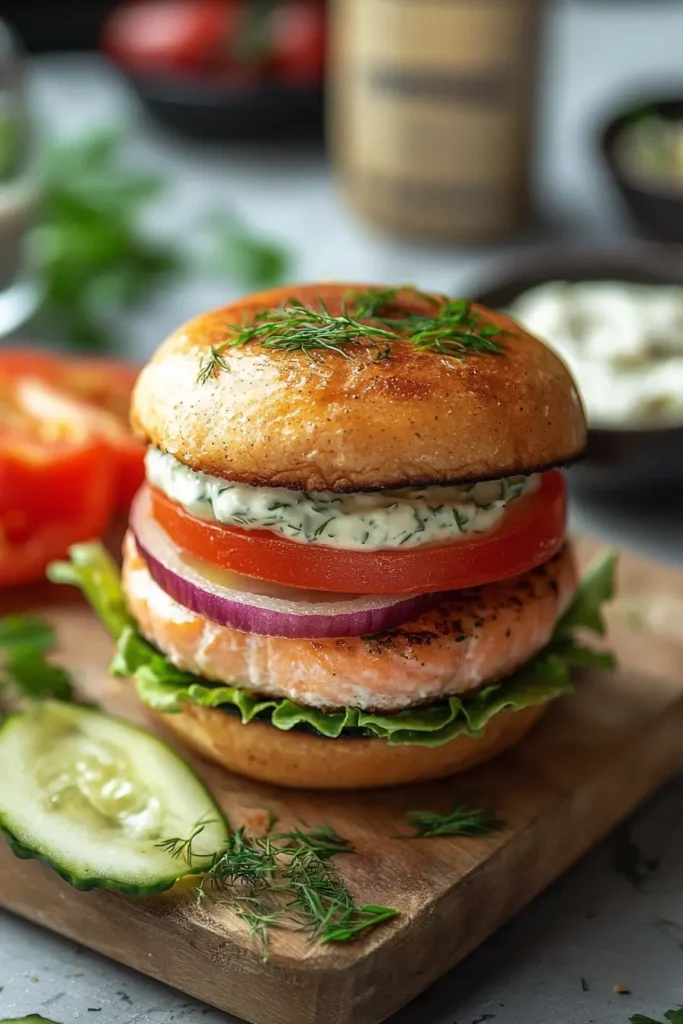
Making Ahead, Storing, Freezing, and Reheating Salmon Burgers
To maximize convenience, prepare salmon burgers ahead of time. Store uncooked patties in the fridge for up to 24 hours or freeze for later use. Refrigerate cooked burgers in an airtight container for up to 3 days, or freeze uncooked or cooked patties for up to 3 months; thaw overnight before reheating. To reheat, warm in the oven or skillet to retain moisture and crispiness. These storing homemade burgers tips ensure your creation remains convenient and flavorful, even on busy days. With proper meal prep hacks, you can enjoy salmon burgers anytime without compromising quality.
Chef’s Secret to the Perfect Salmon Burgers
The secret to perfect salmon burgers lies in balance and technique. Use just enough binder, like breadcrumbs or almond flour, to hold the patties together without overpowering the salmon’s flavor. Enhance seasoning with fresh herbs, citrus zest, or spices for depth. Chill the patties before cooking to improve structure and prevent crumbling. Finish with fresh toppings and a drizzle of sauces for restaurant-quality results. These chef-approved tips and gourmet burger secrets ensure your salmon burgers are flavorful, cohesive, and visually stunning. With these perfect salmon patty techniques, you’ll impress family and friends with every bite.
Print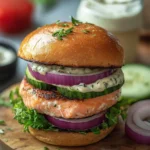
The Best Salmon Burgers Recipe
- Total Time: 25 minutes
- Yield: 4 servings 1x
Description
These easy salmon burgers are made with fresh or canned salmon, herbs, lemon, and bold seasonings. Perfect for a healthy weeknight dinner or a summer BBQ, they’re juicy, flavorful, and versatile enough to please everyone.
Ingredients
- 500g fresh or canned salmon (finely chopped or processed)
- ½ cup breadcrumbs (or almond flour for gluten-free)
- 1 egg (or flax egg for vegan)
- 2 cloves garlic, minced
- Juice of 1 lemon
- 2 tbsp fresh dill or parsley, chopped
- 1 tbsp Dijon mustard
- 1 tsp capers (optional)
- Pinch of smoked paprika (optional)
- Optional add-ins: diced red onion, bell peppers, jalapeños
- Salt and pepper to taste
- Olive oil or butter (for cooking)
Instructions
- Chop salmon finely or pulse in a food processor until coarsely ground.
- In a large bowl, combine salmon, breadcrumbs, egg, garlic, lemon juice, herbs, mustard, and optional seasonings. Mix until well combined.
- Form into evenly sized patties and chill in the fridge for 15–30 minutes.
- Heat oil in a pan over medium heat. Cook patties for 4–5 minutes per side until golden brown and cooked through.
- Serve on buns, lettuce wraps, or over salad with your favorite toppings and sauces.
Notes
- For extra texture, combine hand-chopped and food-processed salmon.
- Chill patties before cooking to help them hold together.
- Substitute breadcrumbs with almond flour, oats, or crushed crackers.
- Make ahead: uncooked patties can be refrigerated for 24 hrs or frozen for up to 3 months.
- Cooked patties can be reheated in a skillet or oven to maintain crispiness.
- Prep Time: 15 minutes
- Cook Time: 10 minutes
- Category: Main Course
- Method: Stovetop, Grill, or Oven
- Cuisine: American, Seafood
Nutrition
- Serving Size: 1 burger
- Calories: ~250
- Sugar: ~1g
- Sodium: ~400mg
- Fat: ~14g
- Saturated Fat: ~2g
- Unsaturated Fat: ~10g
- Trans Fat: 0g
- Carbohydrates: ~8g
- Fiber: ~1g
- Protein: ~25g
- Cholesterol: ~70mg
